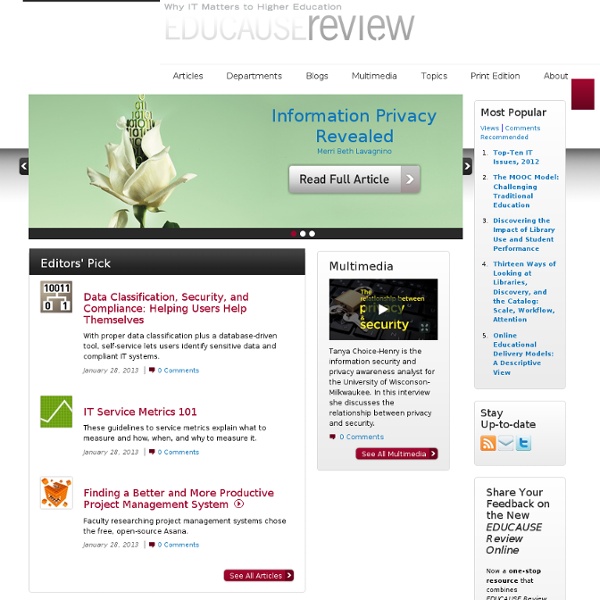



Building the E-University: Transforming Athabasca University At Athabasca University Dietmar Kennepohl is Associate Vice President Academic and Professor of Chemistry, Cindy Ives is Director of the Centre for Learning Design and Development, Brian Stewart is Vice President Information Technology and CIO, and Rory McGreal is Professor, Centre for Distance Education and UNESCO/COL Chair in Open Educational Resources. Key Takeaways Reinventing itself as an online university required that Athabasca University go beyond technological integration to make sweeping changes to its culture, skill sets, and processes. Aided by two externally funded programs, the university launched complex, large-scale initiatives on a tight two-year time frame that demanded effective leadership and project management skills and led to key lessons learned. Initial project results indicate not only that real change is occurring at AU, but also that faculty and administrators are increasingly willing to examine and change their traditional practices. AU Special Projects Endnotes
Les propositions - Mission Fourgous 01/ Organiser un Grenelle de l’innovation des pratiques pédagogiques à l’ère du numérique - Créer un crédit e-éducation État-université-Entreprise - Préparer les jeunes générations aux e-compétences, aux métiers d’avenir et à la mondialisation pour améliorer la compétitivité française. Voici les extraits du rapport liés à cette proposition : Vers une société en réseau Vers la construction d’une intelligence collective La créativité : un enjeu de société Former aux pratiques innovantes par la recherche Apprentissage formels, non-formels, informels 02/ Encourager l’équipement de l’école à l’université en outils et ressources numériques afin de favoriser les usages - Commencer toutes les réformes et l’équipement par le primaire, - Poursuivre les équipements, notamment en Internet, ENT, TNI, tablettes, - Favoriser la conception de logiciels spécifiquement pensés pour l’apprentissage formel*, l’auto-évaluation, l’évaluation formative et également pour l’apprentissage informel**.
Spaced Repetition DIY U L'iPad à l'école : usages, avantages et défis 10/12/2013 11:51 Classé dans : Que dit la recherche ? La Chaire de recherche du Canada sur les technologies en éducation vient d’annoncer la publication du rapport intitulé L’iPad à l’école : usages, avantages et défis - Résultats d’une enquête auprès de 6057 élèves et 302 enseignants du Québec (Canada).Que font ces quelque 15 000 élèves du Québec qui utilisent de façon quotidienne l’iPad en salle de classe? Quels sont les avantages de cet outil technologique à l’école? Quels sont les défis rencontrés, tant par les élèves que par les enseignants?
My Online Summer: Getting Ready [This is the first in a series of posts about teaching a fully-online course for the first time. -- @jbj] This summer, I’m teaching a world lit survey class entirely online. I’ve taught the course several times as a face-to-face course, both in the summer and during the regular semester, and so I’m pretty comfortable with the material. This, however, will be the first time I’ve taught a class entirely online. Moreover, for complicated reasons, I’ve agreed to teach the class entirely–or to the greatest extent possible–using the baked-in tools in Blackboard Vista, rather than kludging together something with a wiki or WordPress, as would normally be my wont. Combining those two sources of (personal) novelty seemed like a natural for ProfHacker, and so for the next seven weeks (the five weeks of the course, plus this preview post and a post-mortem), I’ll sort out how the course is going, what I’m doing wrong, and what kinds of things we’re doing well. 2) The LMS bit. Click for full-size.
DIY, says 'edupunk' star. Distortion and sell-out, say critics Few scholarly cheers for author's 'branded' vision of accessible higher education. Sarah Cunnane writes In 2008, a diverse group of people working in and around higher education decided they were - in the words of the film Network - "mad as hell, and not going to take it any more". The cause: the omnipresence of "cookie-cutter" content management systems for teaching such as Blackboard and the focus on new technology as a force for change, rather than on the potential of the community around that technology. The result: edupunk. On his blog, Groom has described the importance of the work of edupunks, who he says are working in opposition to "the decline of higher ed into a series of feeding lots for the private sector job market". The definition of edupunk is somewhat loose, as preferred by its creator and early adopters. "It's a word that has had a lot of different meanings, but it appeals to people," Kamenetz says. That's not punk, that's ridiculous What about the revolution? Not fade away
How Web-Savvy Edupunks Are Transforming American Higher Education Reinventing School. You co-design it, We make it possible - Re-imagine, Reinvent, Rethink, Empathy, Education 3.0, Transform, Revolution, Collaboration, Design Thinking Challenge, 21st Century Skills, Project Edupunk Edupunk is a do it yourself (DIY) attitude to teaching and learning practices.[1][2] Tom Kuntz described edupunk as "an approach to teaching that avoids mainstream tools like PowerPoint and Blackboard, and instead aims to bring the rebellious attitude and D.I.Y. ethos of ’70s bands like The Clash to the classroom."[3] Many instructional applications can be described as DIY education or Edupunk. Jim Groom as "poster boy" for edupunk The term was first used on May 25, 2008 by Jim Groom in his blog,[4] and covered less than a week later in the Chronicle of Higher Education.[1] Stephen Downes, an online education theorist and an editor for the International Journal of Instructional Technology and Distance Learning, noted that "the concept of Edupunk has totally caught wind, spreading through the blogosphere like wildfire".[5] Aspects of edupunk[edit] The reaction to corporate influence on education is only one part of edupunk, though. Examples of edupunk[edit] See also[edit] Notes[edit]
Center4Edupunx